- Home
- Linda Lael Miller
Deadly Gamble Page 11
Deadly Gamble Read online
Page 11
Was I like my dad?
Who the hell was I, anyway?
Right then, I felt about as real as Nick.
I forced myself to eat most of the food, paid the bill and left.
Still too early to leave for Tucson, and my cell phone was silent.
I scrolled back to the text message, fortified by breakfast.
U-WLL-DY.
Catchy.
Also chickenshit. Up there with sending nasty e-mails and then blocking the reply, so the flamed can’t fight back.
I tossed the cell back into my purse and headed for the high school. In these post-Columbine days, a person can’t just walk into the nearest institute of lower learning and snoop around, so I followed presumed protocol and stopped off at the office. The secretary had probably been around since the Reagan administration, if not longer, and she went pale when I introduced myself and added that I was Evie Larimer’s daughter.
Right then, I wasn’t up to claiming Ron.
“Mary Josephine?” the woman trilled, looking up from the driver’s license I’d given her as ID. She had blue hair, four chins, and wore a vintage polyester pantsuit. Either she shopped on eBay, or she didn’t shop at all.
“I go by Mojo,” I said. I’m not sure why I wanted to get that straight, up front, but I did. Mary Josephine Mayhugh was a stranger to me. Mojo Sheepshanks might have been a fraud, but I could recall every day of her existence.
The woman rose halfway out of her chair and promptly sank into it again. Her hand trembled as she handed back my license. “I’m sorry,” she said, with a flustered attempt at a smile. “It’s something of a shock.”
I leaned on the counter. A bell rang shrilly in the background, and I was vaguely aware of kids stampeding through the halls behind me. Geoff had probably attended this school, I thought, with a jolt, at least until he was sent up for murder. I would have been a student there, too, most likely, if it hadn’t been for the events of August 18, 1983.
I drew a deep breath and released it slowly. Tried to remember what I’d learned from The Damn Fool’s Guide to Zen.
Not much, apparently.
My nerves were jumping, and the present moment sucked.
“It was awful, what happened,” the woman said. I glanced belatedly at the little sign on the countertop; it was a day for afterthoughts. Her name was Mavis Rogers, unless she was filling in for somebody. “Geoff seemed like such a nice boy.”
I didn’t comment. Anything I said would have been ironic, if not scathing, and Mavis didn’t deserve that. It wasn’t her fault I came from a family that made the Mansons look like the cast of a holiday mayonnaise commercial.
“I was hoping I could look at some yearbooks,” I said. I hadn’t been aware, until the words came out of my mouth, that I was hoping any such thing, but there you are. My subconscious mind seemed to be elbowing its way to the foreground lately. “From when my parents were in school.”
Mavis swallowed. “Well, dear,” she said, “I can certainly show you the ones with Evie’s pictures in them, but Ron Mayhugh—” she lowered her voice, looked from side-to-side “—dropped out.”
I wasn’t surprised that dear old Dad never got a diploma. Clearly, he hadn’t been big on focused effort toward a goal. Some of my thoughts splintered off from the main bunch and hot-trotted it for the nearest employment agency.
Give me a real job. Any real job.
“We were all just sick when Evie married him,” Mavis confided. She got out of her chair again, but this time, she followed through and actually stayed on her feet. “I’ll be right back,” she said. “Wait here.”
I leaned against the counter and studied a schedule of PTA meetings.
Then it came to me that leaning was something an undisciplined person without a real job would do, somebody with Ron Mayhugh’s blood flowing through their veins, for instance, and I stood up straight.
Mavis returned, after a considerable interval of good posture on my part, and handed me four dusty yearbooks from the 1960s. Back then, evidently, students went through eight grades, at least in Cactus Bend, and then made the leap to high school.
I thanked Mavis, took the books and sat down in one of the plastic chairs nearby. Another bell rang, and the shuffle of kids moving through the halls receded to blessed silence.
My hands trembled a little as I opened the cover of the first book, a thin volume with 1963 and the school logo embossed on the cover. I found Evie Larimer, geeky-haired and grinning, with the other freshmen. Her eyes were bright with innocence—she probably hadn’t gotten involved with Geoff’s father yet, or mine. She hadn’t given up her scholarship, and her dreams, whatever they might have been, to work rotating shifts at the Happy Trails Truck Stop. I wished she’d start moving around within the picture, Harry Potter-style, and speak to me. Explain everything.
I could have warned her then. Take another road, Mom. Write yourself another script, because this one ends badly.
A tear plopped on the page before I realized I was crying.
I wiped it away with the tip of an index finger and studied the faces of the other students. No one looked familiar, and I didn’t recognize any of the names beneath the photos.
When I turned to the sophomore class, though, my gaze went straight to one particular shot. Rod Waters. Class president. Captain of the football team.
His resemblance to Geoff was beyond uncanny.
Here he was, then. Nemesis #1. The guy who got my mother pregnant, the bearer of the Bad Seed.
The poached eggs I’d had for breakfast roiled in my stomach.
I closed the book and opened the second in the four-year sequence of my mother’s high school career. All the career she was ever going to have, as it turned out.
I sniffled.
Mom made the honor society as a sophomore. She went to Girl’s State, whatever that was, and made the varsity cheerleading squad. Her hair looked a little better, too. I felt an aching tenderness, flipping through those pages. It was a kind of reverse fortune-telling, like peering into a crystal ball focused on the past instead of the future. Evelyn Larimer didn’t look like the kind of girl who would end up dead of a gunshot wound on the living room floor of a rented double-wide, but, then, what did that kind of girl look like?
I soldiered my way through my mother’s junior and senior years. By the time her graduation picture was taken, the light had gone out of her eyes. She looked resigned. Maybe she was already carrying Geoff. She knew college was down the drain, I could see that in her face.
I wondered if anyone else had seen it.
Like my grandparents.
It came to me suddenly that I didn’t know thing one about the Larimers, or the Mayhughs, for that matter.
I hadn’t even thought to ask Uncle Clive for the genealogical particulars, or Boomer, either.
I’d Googled the senator and Barbara, and their progeny to boot.
And I’d stopped there, as if there had been no previous generations. As if Mom and Dad and all of the rest of them had simply sprung into being one day, fully grown.
“Holy crap,” I muttered, stunned at the scope of my oversight, slamming the last yearbook shut.
Mavis started a little, behind her counter.
I took the four volumes back to her in a stack, thanked her and left.
I drove to the library next. It was about the size of Greer’s closet, but there was a computer allotted to public use. I waited, none too patiently, until the matron cruising for God-knows-what went offline and wandered away, then I grabbed the chair, bellied up to the keyboard and logged on.
There were a few newspaper pieces on the murders tucked away in various archives, and several chronicling my abduction. I’d seen them before, but I scanned them again. No mention of either Mom’s parents or Dad’s. I tried the senator’s site and read his biography, but he too seemed to have skipped childhood and simply appeared on the planet as an adult with a political agenda.
I printed out the whole batch, paid the
librarian for the copies and got back in my car.
Boomer was in the cottage at the cemetery when I walked in. He was just opening one of those old-fashioned black lunch boxes, the kind with a thermos in the lid. He paused in the act of removing the wax paper wrapping from what looked like a ham and cheese on rye and studied me with polite uncertainty.
He started to rise, and I gestured for him to stay seated.
“Did you know the Larimers and the Mayhughs?” I asked, right out. “My grandparents, I mean?”
Boomer sagged a little. He’d been a fount of information all along, but now, all of a sudden, he’d dried up.
I waited.
Boomer finally relented, but with obvious reluctance.
“Evie and Clive, they was orphaned real young,” he said. “Come from Tucson or Phoenix originally, I think. Some folks named Wilkerson took them in as foster children, brought them here to Cactus Bend. The Wilkersons is gone now, of course. Been gone a long while.”
A bleak shadow fell over my heart. “What about the Mayhughs?”
Boomer wanted to look away, I could see that, but he held my gaze. I braced myself for yet another non-Hallmark moment.
“Ron came here with his mama, when he was a little kid. She was no better than she should be, if you know what I’m sayin’. She worked at the old Bootstrap Saloon. Place burned down in 1962, along with the movie theatre. Her old man got out of jail around that time, and she lit out with him. Ron stayed behind, lived with whoever’d take him in, for however long. Dropped out of school after the eighth grade.” Boomer found a bright spot in my dismal family history. “He got his GED, though. Did it to please Evie. He might have been good with computers, too, if he’d lived. Had an old TRS-80 he picked up someplace. Used to fiddle with it all the time.”
I almost wished I hadn’t asked about my grandparents.
The more I learned, the worse I felt.
I thanked Boomer, went back to my car and headed for Tucson.
Jolie wouldn’t be off work for hours yet, but I needed a hole to crawl into.
I drove to her place, a garden apartment in the university district, extracted the key from the fake rock on the back patio, and let myself in through the kitchen door. I was peering into the refrigerator when a low growl sounded behind me.
The hairs on my nape went rigid.
Big dog, in deadly earnest.
When had Jolie gotten a dog?
More importantly, why hadn’t she told me?
The growl deepened to a ferocious rumble.
“Don’t move,” I said, talking to both myself and the dog.
Slowly, very slowly, I straightened and turned my head just far enough to see the fiend half-crouched in the doorway between Jolie’s kitchen and living room. He looked like a cloning experiment gone terribly wrong, with his coarse brindled coat and his laid-back ears. I swear to God his eyes were yellow as candle flames, and he didn’t have teeth, he had fangs.
He lunged.
I scrambled up the shelves of Jolie’s refrigerator with a clatter and huddled on top, as close to the wall as I could get.
The hell-hound reared up on his hind legs and did his level best to get me, but I was maybe three inches out from his snarling, slobbering maw. When he finally exhausted himself, trying to tear off a chunk of any old part of my anatomy, he curled up in a big, quivering ball in front of the fridge.
My legs were going to sleep, so I shifted, sat Indian-style, like some kind of human cookie jar, and waited for my sister to come home.
My cell phone rang at least three separate times.
It might have been Tucker.
It might have been the nursing home, calling about Lillian.
It might have been another text-message, threatening me with death.
If I got down off that refrigerator, I thought, I would never know, because the Beast would tear me to bloody shreds before I got to my purse.
The dog snoozed, snoring like a dull buzz saw.
I considered getting down, grabbing my bag and making a dive for the back door, but it was just a fantasy to pass the time. I didn’t have a chance in hell of actually making it.
I cupped my chin in one hand and waited.
The dog woke up, snuffled around in the fridge for a while, since the door was still hanging open, and helped himself to a package of bologna. Devoured it in three bites—wrapper, UPC code and all.
I tried to communicate with Jolie by telepathy. I’d never done it before, but I didn’t have much to lose, and the rest of my lifespan to gain.
Nothing happened, of course.
I could muster a dead ex and a ghost cat.
I could make a slot machine pay, if the energy was right.
Evidently, that was the extent of my psychic power.
White Fang dozed again, busy digesting the lunch meat and the plastic, and I got the bright idea to lean over, pull something out of the freezer compartment, and throw it across the room. While he was gnawing at a rock-hard pot roast, I’d make a break for it.
I leaned.
He sprang.
I felt his hot breath against my forearm as I jerked back, just in time to avoid the fate I’d planned for the pot roast.
I yelled for help. As I said, it was a day for afterthoughts.
No response.
Everybody in Jolie’s building, it seemed, had a real job.
I decided to examine the contents of the cupboards on either side of the refrigerator. Maybe I could bean the dog with a soup can and book it before he regained consciousness.
I found two boxes of outdated cereal, a package of stale crackers and the owner’s manual for the microwave. I read it from cover to cover. Taught myself rudimentary Dutch, French, Spanish and Japanese by comparing the translation paragraphs to the English version. I figured I was a cinch for a bright future in appliance repair when, at long last, Jolie appeared in the back door window, shoving her key in the lock.
The Hound of Tucson rolled to his feet, yawned and gave a welcoming whimper.
Jolie paused to pet him, and her dark eyes danced as she looked up at me, perched on the top of her refrigerator. “I see you made yourself at home,” she said, plunking her briefcase and purse on the counter next to the door. She’d had a weave since I saw her last, and she looked sleekly professional in her tailored black slacks and crisp white blouse. No blood, gore or bone dust in evidence. The wonder of lab coats.
“You didn’t mention the dog when we talked on the phone,” I pointed out. I had to pee like a cow on a flat rock, but I wasn’t getting down until she either put the demon outside or shot him with a tranquilizer dart. Even then, he’d have to twitch for five minutes before the coast could be considered clear.
“Oops,” Jolie said, with a crooked, twinkly little smile. She gave Brutus a dog biscuit, closed the refrigerator with dispatch and looked up at me. “You can get down now.”
“No way,” I said. “That thing is vicious. He’ll rip my throat out.”
“He’s a pussycat,” Jolie assured me, and bent to pat his head. Her plentitude of tiny braids shimmered as she moved. “I got him at the pound last week. Another day and a half, and they’d have put him to sleep.”
“Timing is everything.”
Jolie laughed. “Get down, Moje. Sweetnik isn’t going to hurt you.”
“Sweetnik?” I peered over the edge, sizing him up. The name didn’t fit; he looked as big and mean as ever.
“Sweetie for short,” Jolie said, eyeing him affectionately and scrabbling in the box for another Milk Bone. “We’ve had some robberies and home invasions in the neighborhood lately, so I thought it made sense to get a dog.”
I eased one foot down as far as the countertop. Sweetie didn’t lunge. He was too busy mauling the second biscuit. I risked the other foot.
Sweetie raised his head and growled.
“Sweetie, shush,” Jolie cooed.
Sweetie shushed.
I got down.
Stretched my cramped
muscles with some shoulder rolling and some careful leg shaking. “I don’t think you have to worry about home invasions,” I said.
“I don’t have to worry about you sneaking out of here in the middle of the night without telling me, either,” Jolie quipped. “Sister’s on the move, I’m gonna know it.” She laid her hands on my shoulders and looked me over from head to foot and back again. “When was the last time you had a decent haircut?” she asked.
I sighed. “It’s good to be back in the bosom of my family,” I said.
Jolie grinned. “I’ll pour us some wine, and we’ll have some good ole girl talk,” she responded.
I took a cautious side step in the direction of the hallway. “I’ve been on top of your refrigerator for three and a half hours,” I reminded her. “I need to use the bathroom.”
Sweetie looked up, gave a companionable little snarl.
“You do, too, don’t you, fella?” Jolie asked the dog, taking a leash from a drawer and hooking it to his collar. She met my gaze. “You do your thing, Sweetie will do his, and then we’ll have that wine.”
I nodded.
Dog and woman went out the back door.
I clamped my knees together and hop-sprinted for the john.
CHAPTER
8
L ike me, Jolie wasn’t into premeditated cooking, so once Sweetie and I had both relieved ourselves—I, at least, washed my paws afterward—my sister and I piled into her black Pathfinder and headed for the nearest restaurant.
The place was Italian, a fragrant link in a national chain. The red-and-white checkered tablecloths, plank floors and Chianti-bottle candleholders provided atmosphere. We ordered iced tea, after sighing over the wine list, and the waiter brought warm bread and poured olive oil into a saucer, adding a squiggle of balsamic vinegar for yum.
While I pigged out, Jolie sat with her fingers curved into a graceful tent under her chin. Her dark eyes were large and luminous as she pondered me, and for a moment, I saw her dad in them and missed him sorely. Ham had made room in his life for Greer and me, and I would always appreciate that.
Jolie was perceptive, and she leaned in a little, prodded, “What are you thinking about right now?”

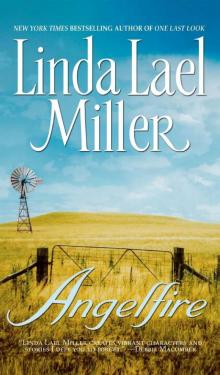 Angelfire
Angelfire Moonfire
Moonfire The Yankee Widow
The Yankee Widow The Cowboy Way
The Cowboy Way Country Strong--A Novel
Country Strong--A Novel Forever and a Day
Forever and a Day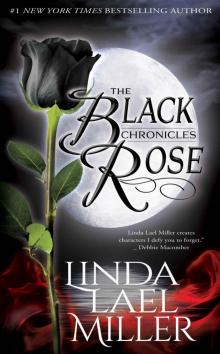 The Black Rose Chronicles
The Black Rose Chronicles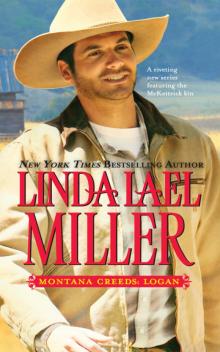 Montana Creeds: Logan
Montana Creeds: Logan My Darling Melissa
My Darling Melissa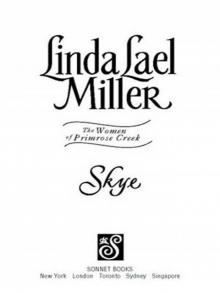 Skye
Skye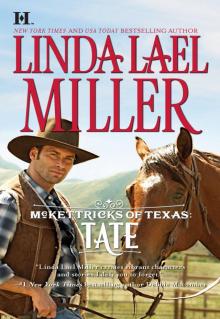 McKettricks of Texas: Tate
McKettricks of Texas: Tate Springwater Seasons
Springwater Seasons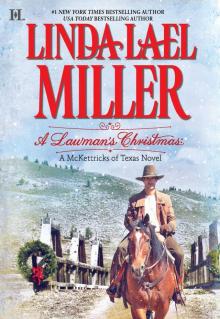 A Lawman's Christmas
A Lawman's Christmas Sierra's Homecoming
Sierra's Homecoming![Parable, Montana [4] Big Sky Summer Read online](http://i1.bookreadfree.com/i/03/22/parable_montana_4_big_sky_summer_preview.jpg) Parable, Montana [4] Big Sky Summer
Parable, Montana [4] Big Sky Summer One Last Weekend
One Last Weekend A Stone Creek Collection, Volume 2
A Stone Creek Collection, Volume 2 Tonight and Always
Tonight and Always Fletcher's Woman
Fletcher's Woman A Snow Country Christmas
A Snow Country Christmas The Last Chance Cafe
The Last Chance Cafe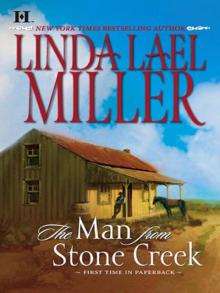 The Man from Stone Creek
The Man from Stone Creek Wanton Angel
Wanton Angel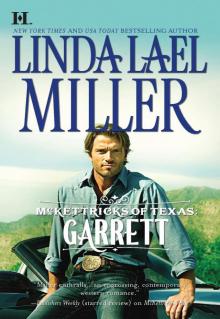 McKettricks of Texas: Garrett
McKettricks of Texas: Garrett Memory's Embrace
Memory's Embrace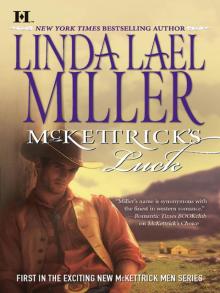 McKettrick's Luck
McKettrick's Luck Pirates
Pirates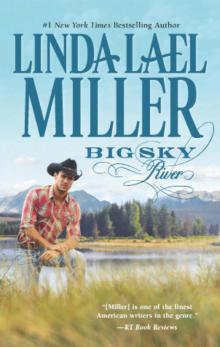 Big Sky River
Big Sky River Willow: A Novel (No Series)
Willow: A Novel (No Series) The McKettrick Legend: Sierra's HomecomingThe McKettrick Way (Hqn)
The McKettrick Legend: Sierra's HomecomingThe McKettrick Way (Hqn) Glory, Glory: Snowbound with the Bodyguard
Glory, Glory: Snowbound with the Bodyguard Two Brothers
Two Brothers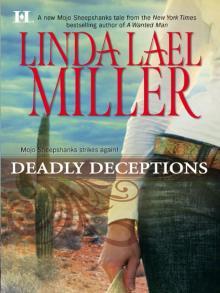 Deadly Deceptions
Deadly Deceptions Big Sky Secrets
Big Sky Secrets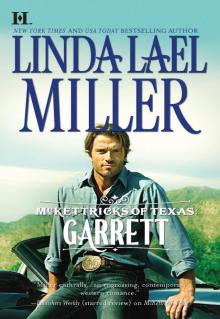 Garrett
Garrett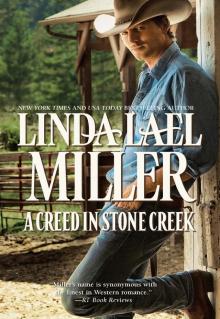 A Creed in Stone Creek
A Creed in Stone Creek Megan
Megan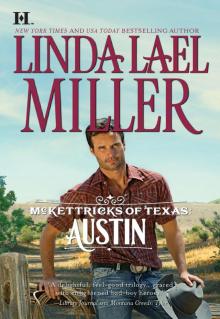 McKettricks of Texas: Austin
McKettricks of Texas: Austin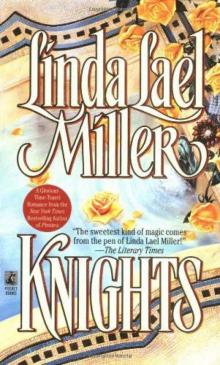 Knights
Knights High Country Bride
High Country Bride More Than Words Volume 4
More Than Words Volume 4 Glory, Glory
Glory, Glory Daring Moves
Daring Moves Lily and the Major
Lily and the Major Courting Susannah
Courting Susannah Banner O'Brien
Banner O'Brien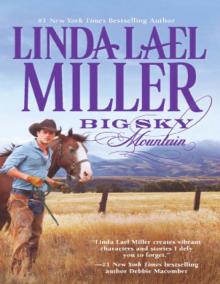 Big Sky Mountain
Big Sky Mountain Linda Lael Miller Bundle
Linda Lael Miller Bundle McKettrick's Pride
McKettrick's Pride A Stone Creek Collection Volume 1
A Stone Creek Collection Volume 1 A Wanted Man
A Wanted Man Big Sky Country
Big Sky Country The McKettrick Legend
The McKettrick Legend Christy
Christy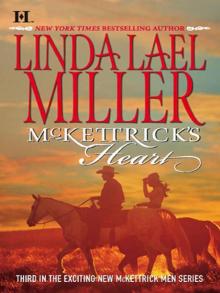 McKettrick's Heart
McKettrick's Heart Resurrection
Resurrection Arizona Heat
Arizona Heat Secondhand Bride
Secondhand Bride Snowflakes on the Sea
Snowflakes on the Sea Montana Creeds: Tyler
Montana Creeds: Tyler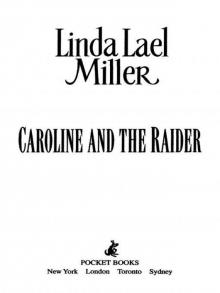 CAROLINE AND THE RAIDER
CAROLINE AND THE RAIDER A Proposal for Christmas: State SecretsThe Five Days of Christmas
A Proposal for Christmas: State SecretsThe Five Days of Christmas Yankee Wife
Yankee Wife Linda Lael Miller Montana Creeds Series Volume 1: Montana Creeds: LoganMontana Creeds: DylanMontana Creeds: Tyler
Linda Lael Miller Montana Creeds Series Volume 1: Montana Creeds: LoganMontana Creeds: DylanMontana Creeds: Tyler The Christmas Brides
The Christmas Brides McKettricks Bundle
McKettricks Bundle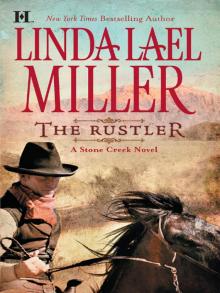 The Rustler
The Rustler Here and Then
Here and Then Only Forever
Only Forever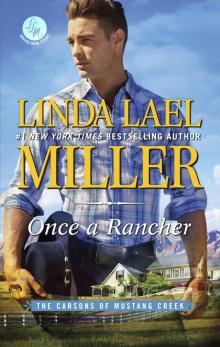 Once a Rancher
Once a Rancher The 24 Days of Christmas
The 24 Days of Christmas Big Sky Wedding
Big Sky Wedding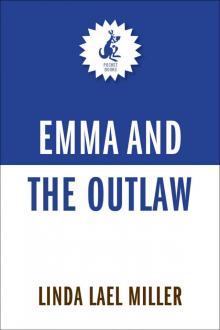 Emma and the Outlaw
Emma and the Outlaw Princess Annie
Princess Annie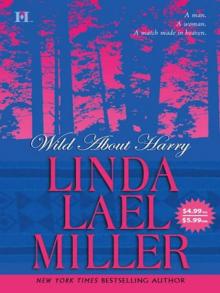 Wild About Harry
Wild About Harry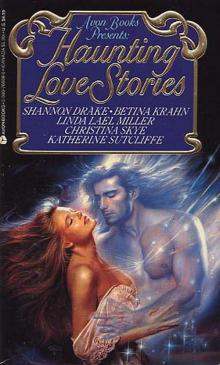 That Other Katherine
That Other Katherine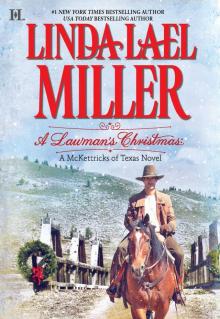 A Lawman's Christmas: A McKettricks of Texas Novel
A Lawman's Christmas: A McKettricks of Texas Novel Just Kate: His Only Wife (Bestselling Author Collection)
Just Kate: His Only Wife (Bestselling Author Collection)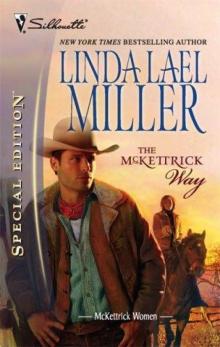 The McKettrick Way
The McKettrick Way Part of the Bargain
Part of the Bargain Taming Charlotte
Taming Charlotte Holiday in Stone Creek
Holiday in Stone Creek One Last Look
One Last Look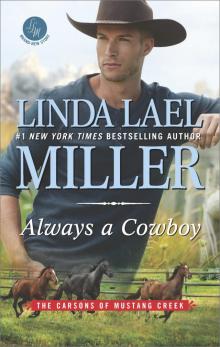 Always a Cowboy
Always a Cowboy Batteries Not Required
Batteries Not Required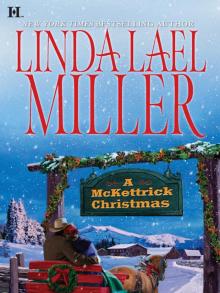 A McKettrick Christmas
A McKettrick Christmas For All Eternity
For All Eternity The Marriage Season
The Marriage Season Corbin's Fancy
Corbin's Fancy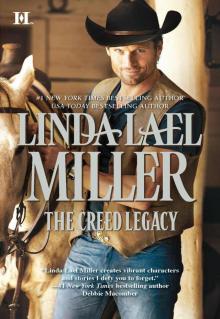 The Creed Legacy
The Creed Legacy Springwater Wedding
Springwater Wedding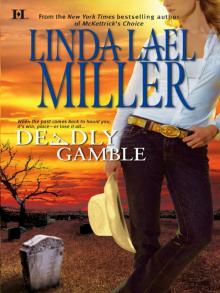 Deadly Gamble
Deadly Gamble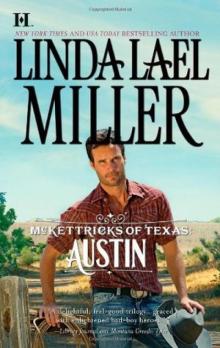 Austin
Austin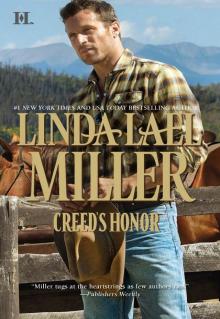 Creed's Honor
Creed's Honor A Creed Country Christmas
A Creed Country Christmas Escape from Cabriz
Escape from Cabriz There and Now
There and Now The Bridegroom
The Bridegroom State Secrets
State Secrets Bridget
Bridget